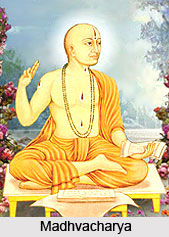 Madhvacharya was born in a tulu Brahman family in Karnataka. He was born on an auspicious day of Vijaya dasami in 1238 AD. His father Madhyageha. Bhatta was a pandit and was an expert in history and Puranas. Madhyageha Bhatta had no child as his two sons had passed away early. He performed penance in order to have a son at the temple of Anantesvara. By Lord`s grace he got a son who went on to become a great acharya. Mukhyaprana entered into the body of Madhyageha`s wife and delivered a beautiful infant. He was named initially named Vasudeva.
Madhvacharya was born in a tulu Brahman family in Karnataka. He was born on an auspicious day of Vijaya dasami in 1238 AD. His father Madhyageha. Bhatta was a pandit and was an expert in history and Puranas. Madhyageha Bhatta had no child as his two sons had passed away early. He performed penance in order to have a son at the temple of Anantesvara. By Lord`s grace he got a son who went on to become a great acharya. Mukhyaprana entered into the body of Madhyageha`s wife and delivered a beautiful infant. He was named initially named Vasudeva.
Right from his childhood miracles occurred. His father took him to the temple and dedicated him to Lord. When the infant was fed by mistake with baked horse grain his health was not affected. At the age of one he clung to bull`s tail and went through grazing grounds and jungles where the bull travelled through. He satisfied a debtor of his father by giving him some tamarind seeds. The villagers were surprised as well as happy at the presence of a divine child.
Later on Madhyageha Bhatta initiated his son in the study of the alphabets. Once when he was going to the village of Neyarnpalli with his mother, Vasudeva came across a Brahmana named Siva. He was narrating a Pauranika episode in a wrong way to a large section of audience. The boy corrected him thereby gaining the applause of the audience.
At the age of eight he was given a sacred thread by his father with a specific commandment. It was found that he mastered everything in no time. He excelled in everything.
Purna prajna is the name given to Madhav at the time of sannyasa (renunciation). At the time of consecration the name conferred on him as the Master of Vedanta is "Ananda Tirtha". Madhva was the pen name assumed by the Acharya to author all his works.
While he was in his teens he had set on a tour to South India. He visited several places of pilgrimage like Anantasayana, Kanyakumsri, Ramesvara. He preached Tattvavada or religious truth to the people. He attacked superstitions and believed that it should not be mixed with religion. In Badri, he bathed in the holy Ganga River and observed a vow of silence of 48 days. Thereafter he travelled to Vyasa Badri where he met Vyasa at his hermitage and presented him with his commentary of the Gita.




















